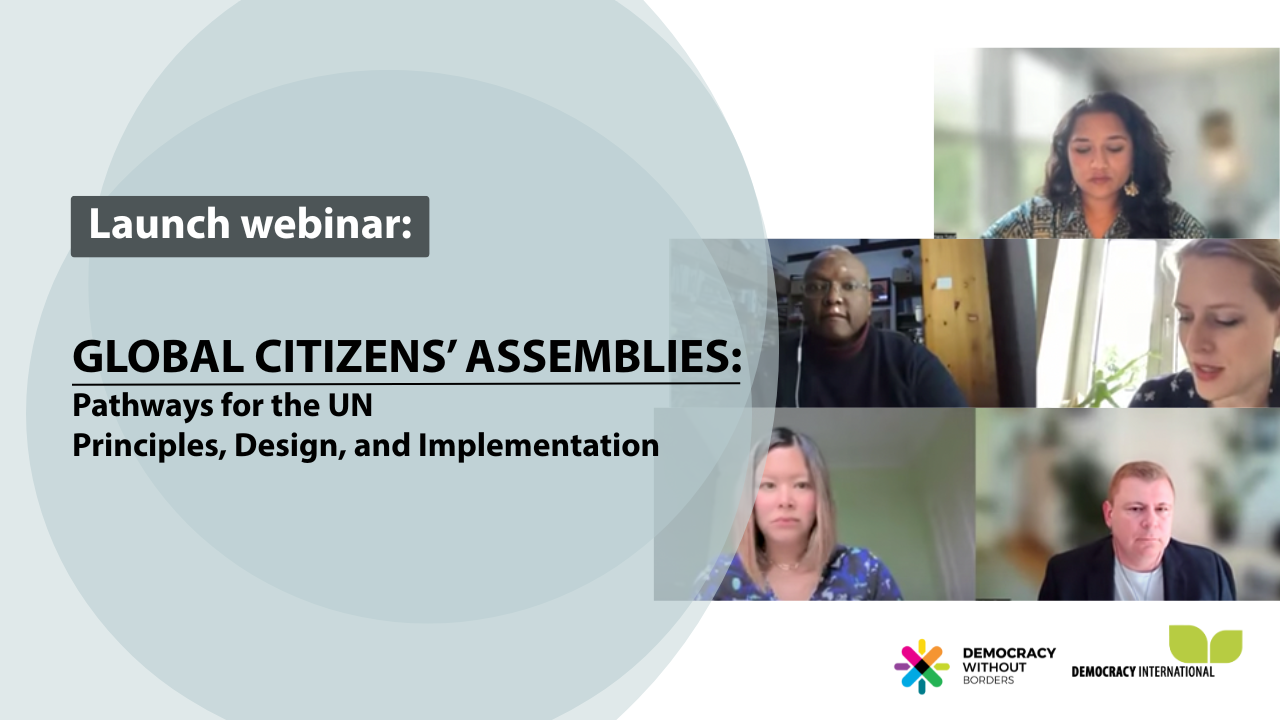The world is at a turning point. As crises mount — from climate breakdown to technological disruption and growing authoritarianism — our systems of global governance are not stepping up to the task. We are trying to solve 21st-century problems with 20th-century models.
The very institutions designed to protect peace, human rights and sustainable development often feel distant to the people most affected by their decisions. And yet, these global challenges demand solutions that include all of us. That’s why, together with Democracy Without Borders, Democracy International has published a new policy paper:
Global Citizens’ Assemblies – Pathways for the UN: Principles, Design, and Implementation.
This isn’t just another white paper. It’s a call to action and a realistic roadmap. Global Citizens’ Assemblies are not utopian proposals, they’re grounded in real-world experiments. They work, and they can be scaled.
Why Global Citizens Assemblies?
Citizens’ Assemblies are particularly good at creating the space for mutual listening, reflection and reasoned exchange — something that’s often missing in fast-paced, polarised political environments. Because participants are selected by lottery to reflect the diversity of the general population, they bring different life experiences to the table, but they aren’t there to defend fixed positions or party lines. Instead, they work together to understand complex issues, hear from experts and each other, and develop recommendations grounded in the common good.
When well-designed, assemblies can surface overlooked perspectives, build empathy across differences, and foster legitimacy. This is especially true for difficult or contested topics where political systems struggle to act.
Citizens as decision-makers
Citizens’ Assemblies are not just procedural tools, they offer a space where people can exercise agency, reason together, and come up with workable compromises. As Nicole Curato, co-author of the brief and currently at the University of Birmingham, explained during the launch, “The evidence is clear that when provided with time, information and space to deliberate, everyday citizens can be thoughtful, open-mindedand competent decision-makers.”
Tim Murithi of the Institute for Justice and Reconciliation framed Global Citizens’ Assemblies in the context of the current global interregnum. “The post–World War II order is ending,” he said. “The choice before us is to capitulate to authoritarianism or to forge a new democratic global order.” Every person, he emphasised, must have “the equal right to participate in reconfiguring their society.”
These reflections highlight that Global Citizens’ Assemblies are not only about better policymaking — they are about who gets to shape the future, and on what terms.
From local trust to global ambition
One of the most powerful moments during the launch webinar came from Renata Sene, former mayor of Francisco Morato, Brazil. She spoke from lived experience about how her administration deepened trust through participatory planning and the creation of a Citizens’ Assembly in her city. “We needed a table with many voices,” she said, “And the people came.”
What was possible in Francisco Morato — even in the midst of a pandemic — can be scaled up. Challenges like multilingualism, unequal internet access, and restrictive visa regimes are real, but they are not insurmountable. We’ve already seen the model work.
The 2021 Global Assembly brought together 100 randomly selected people from across the world to deliberate on the climate and ecological crisis. Their diversity strengthened the process, and the resulting People’s Declaration, presented at COP26, proved that global deliberation is possible.
We saw similar potential in the Conference on the Future of Europe, where 800 citizens met in person to deliberate in all 24 official EU languages. Crucially, the process was organised in step with EU institutions to ensure political uptake of the recommendations. Together, these examples show that with the right design, citizens can deliberate across borders and meaningfully shape policy.
A policy pathway through the UN
The policy paper outlines a clear path for Global Citizens’ Assemblies to be embedded in the United Nations system, including the creation of a permanent framework under Article 22 of the UN Charter. This would allow different UN bodies to convene GCAs on global issues as needed while ensuring quality, consistency, and meaningful follow-up.
“This framework can easily be created by the UN General Assembly by making use of Article 22 of the UN Charter, which allows the General Assembly to set up subsidiary bodies as needed. It’s a well-established and flexible legal mechanism.” said Andreas Bummel, from Democracy Without Borders and co-author of the paper “The real challenge now is political will at the UN, on the part of member states and their readiness to invest into this venture, even under difficult circumstances.”
 |
Watch the full launch webinar here |
A rich field of practice
The policy brief is the result of collaborative work between advocates, scholars and practitioners. It was published alongside a webinar that brought together voices from across the deliberative democracy field.
Several expert reviewers offered reflections that both affirmed and sharpened the proposals. Farsan Ghassim of the University of Oxford warned that “any deviation from randomness chips away at legitimacy,” cautioning that allowing selective overrepresentation risks empowering those who decide “who is worth representing more,” and thereby opening the door to elite control.
Mathias Koenig-Archibugi from the London School of Economics urged caution in framing, noting, “If this is seen as another elite project, it may alienate the very citizens it seeks to engage.” He called for pluralism in process and restraint in prescribing outcomes.
Others focused on implementation. Doina Stratu of the Polytechnic University of Valencia argued that Citizens’ Assemblies are “not an experiment anymore — they are a structural correction to a broken system,” citing Article 22 as a clear legal basis. Antoine Vergne of Missions Publiques cautioned against early standardisation, stating, “Democracy at the global level needs to be fractal, flexible and multi-voiced.”
David Levai of the Iswe Foundation pointed to the lack of momentum following the 2024 UN Summit of the Future and stressed the need to prove the model through action. He described the upcoming Global Citizens’ Assembly ahead of COP30 in Brazil as a vital step toward embedding citizen deliberation directly into international negotiations.
The right to shape our future
Global Citizens’ Assemblies are not a silver bullet, but they are a piece of the puzzle.
We are living through a moment of unprecedented pressure on multilateralism. International cooperation is underfunded, political will is fragmented, and many governments are retreating into nationalist reflexes. But this backlash against the multilateral system is at odds with the interconnected world we live in. We need institutions like the United Nations — but we also need them to evolve: to become more democratic, more inclusive, and no longer reliant solely on states to define global priorities.
Citizens around the world are ready. The UN75 consultation showed overwhelming global public support for the UN and its mission. What’s needed now is leadership: a coalition of member states prepared to take up democratic innovations like Global Citizens’ Assemblies and make them real.
Because if citizens can deliberate, compromise and find common ground, so can the institutions that represent them. In a moment of fragmentation and risk, hope grounded in collective action is not idealistic — it’s essential.




